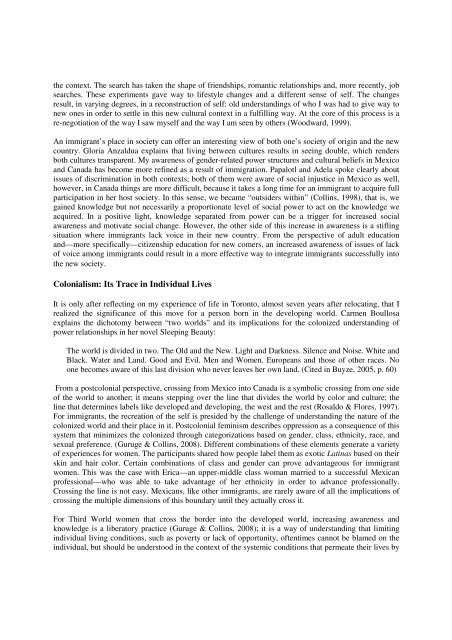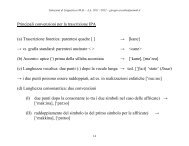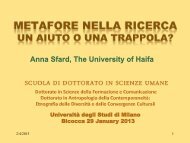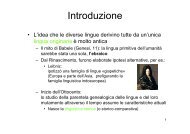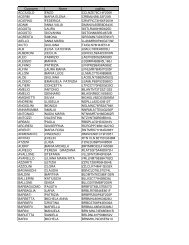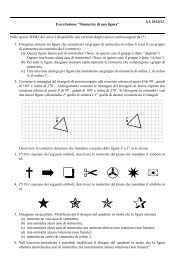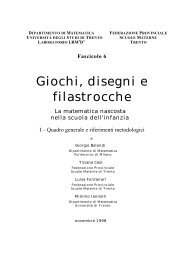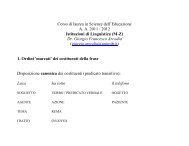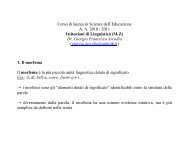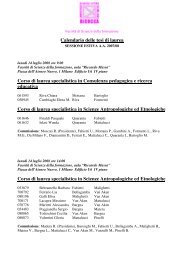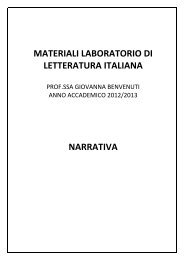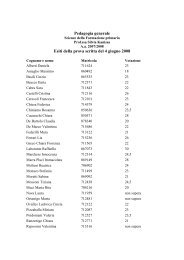Life history research: A contribution to processes of adult learning ...
Life history research: A contribution to processes of adult learning ...
Life history research: A contribution to processes of adult learning ...
You also want an ePaper? Increase the reach of your titles
YUMPU automatically turns print PDFs into web optimized ePapers that Google loves.
the context. The search has taken the shape <strong>of</strong> friendships, romantic relationships and, more recently, job<br />
searches. These experiments gave way <strong>to</strong> lifestyle changes and a different sense <strong>of</strong> self. The changes<br />
result, in varying degrees, in a reconstruction <strong>of</strong> self: old understandings <strong>of</strong> who I was had <strong>to</strong> give way <strong>to</strong><br />
new ones in order <strong>to</strong> settle in this new cultural context in a fulfilling way. At the core <strong>of</strong> this process is a<br />
re-negotiation <strong>of</strong> the way I saw myself and the way I am seen by others (Woodward, 1999).<br />
An immigrant’s place in society can <strong>of</strong>fer an interesting view <strong>of</strong> both one’s society <strong>of</strong> origin and the new<br />
country. Gloria Anzaldua explains that living between cultures results in seeing double, which renders<br />
both cultures transparent. My awareness <strong>of</strong> gender-related power structures and cultural beliefs in Mexico<br />
and Canada has become more refined as a result <strong>of</strong> immigration. Papalotl and Adela spoke clearly about<br />
issues <strong>of</strong> discrimination in both contexts; both <strong>of</strong> them were aware <strong>of</strong> social injustice in Mexico as well,<br />
however, in Canada things are more difficult, because it takes a long time for an immigrant <strong>to</strong> acquire full<br />
participation in her host society. In this sense, we became “outsiders within” (Collins, 1998), that is, we<br />
gained knowledge but not necessarily a proportionate level <strong>of</strong> social power <strong>to</strong> act on the knowledge we<br />
acquired. In a positive light, knowledge separated from power can be a trigger for increased social<br />
awareness and motivate social change. However, the other side <strong>of</strong> this increase in awareness is a stifling<br />
situation where immigrants lack voice in their new country. From the perspective <strong>of</strong> <strong>adult</strong> education<br />
and—more specifically—citizenship education for new comers, an increased awareness <strong>of</strong> issues <strong>of</strong> lack<br />
<strong>of</strong> voice among immigrants could result in a more effective way <strong>to</strong> integrate immigrants successfully in<strong>to</strong><br />
the new society.<br />
Colonialism: Its Trace in Individual Lives<br />
It is only after reflecting on my experience <strong>of</strong> life in Toron<strong>to</strong>, almost seven years after relocating, that I<br />
realized the significance <strong>of</strong> this move for a person born in the developing world. Carmen Boullosa<br />
explains the dicho<strong>to</strong>my between “two worlds” and its implications for the colonized understanding <strong>of</strong><br />
power relationships in her novel Sleeping Beauty:<br />
The world is divided in two. The Old and the New. Light and Darkness. Silence and Noise. White and<br />
Black. Water and Land. Good and Evil. Men and Women. Europeans and those <strong>of</strong> other races. No<br />
one becomes aware <strong>of</strong> this last division who never leaves her own land. (Cited in Buyze, 2005, p. 60)<br />
From a postcolonial perspective, crossing from Mexico in<strong>to</strong> Canada is a symbolic crossing from one side<br />
<strong>of</strong> the world <strong>to</strong> another; it means stepping over the line that divides the world by color and culture; the<br />
line that determines labels like developed and developing, the west and the rest (Rosaldo & Flores, 1997).<br />
For immigrants, the recreation <strong>of</strong> the self is presided by the challenge <strong>of</strong> understanding the nature <strong>of</strong> the<br />
colonized world and their place in it. Postcolonial feminism describes oppression as a consequence <strong>of</strong> this<br />
system that minimizes the colonized through categorizations based on gender, class, ethnicity, race, and<br />
sexual preference. (Guruge & Collins, 2008). Different combinations <strong>of</strong> these elements generate a variety<br />
<strong>of</strong> experiences for women. The participants shared how people label them as exotic Latinas based on their<br />
skin and hair color. Certain combinations <strong>of</strong> class and gender can prove advantageous for immigrant<br />
women. This was the case with Erica—an upper-middle class woman married <strong>to</strong> a successful Mexican<br />
pr<strong>of</strong>essional—who was able <strong>to</strong> take advantage <strong>of</strong> her ethnicity in order <strong>to</strong> advance pr<strong>of</strong>essionally.<br />
Crossing the line is not easy. Mexicans, like other immigrants, are rarely aware <strong>of</strong> all the implications <strong>of</strong><br />
crossing the multiple dimensions <strong>of</strong> this boundary until they actually cross it.<br />
For Third World women that cross the border in<strong>to</strong> the developed world, increasing awareness and<br />
knowledge is a libera<strong>to</strong>ry practice (Guruge & Collins, 2008); it is a way <strong>of</strong> understanding that limiting<br />
individual living conditions, such as poverty or lack <strong>of</strong> opportunity, <strong>of</strong>tentimes cannot be blamed on the<br />
individual, but should be unders<strong>to</strong>od in the context <strong>of</strong> the systemic conditions that permeate their lives by


